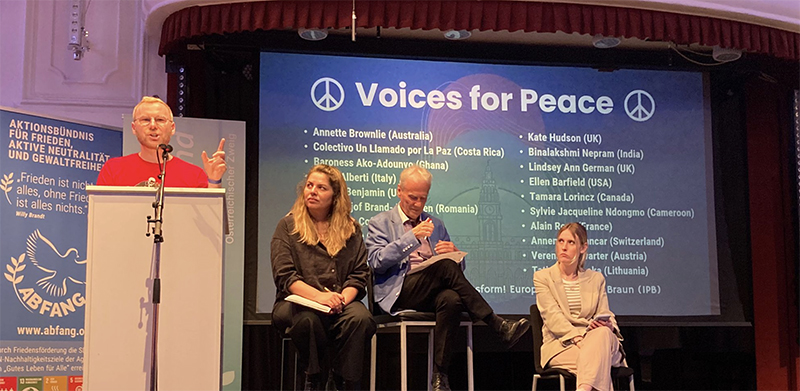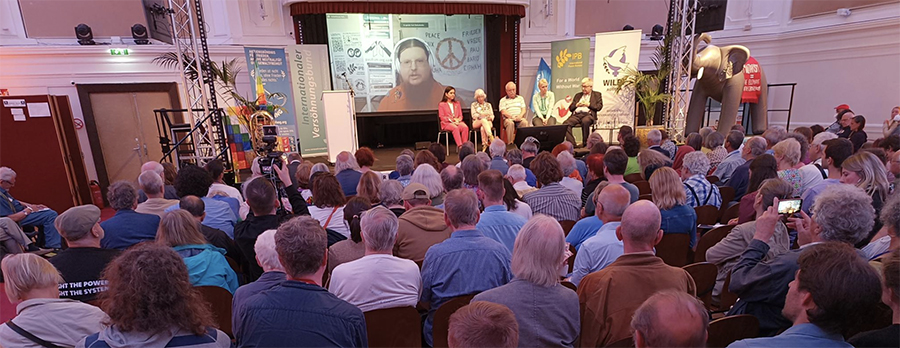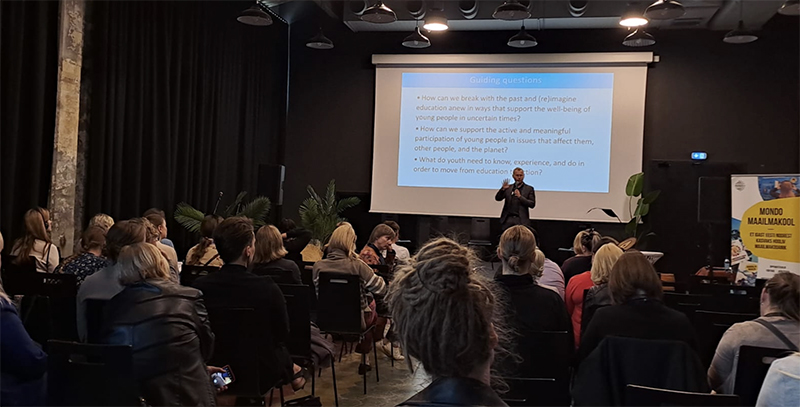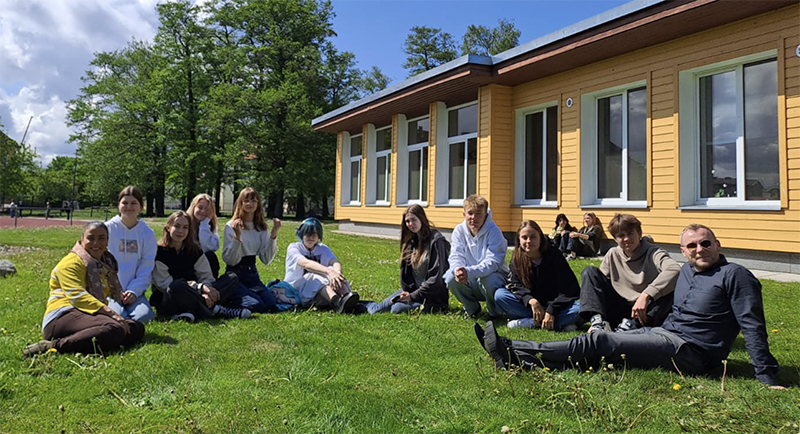
Phill Gittins in Vienna.
By World BEYOND War, June 14, 2023
World BEYOND War Education Director Phill Gittins, Board Member Yurii Sheliazhenko, and Advisory Board Members Ann Wright and Tamara Lorincz participated in an international summit for peace in Ukraine, held in Vienna, Austria, June 10-11. It was a struggle to be able to hold the event at all. Here are Yurii’s remarks, and Ann Wright’s text and video. The summit brought together approximately 300 people from 32 countries.
Its focus was on discussing and debating the opportunities and challenges facing the global community in advancing the prospects of ending the war in Ukraine. Its aim was to issue a global call to action and co-create a formal declaration. At its core, the summit stressed the importance of pursuing ‘Peace by peaceful means’ and the necessity for a ‘Ceasefire and negotiations now’.
The summit consisted of in-person and online speakers, panel discussions, and working groups on Ukraine and wider issues of peace, security, and war.
Phill Gittins came away with three things that can be considered as highlights from the summit:
The first thing was the intentional focus on featuring speakers from both the global North and South. Examples included Drs Noam Chomsky and Jeffrey Sachs, Clare Daley (MEP), and David Choquehuan (Vice President, Bolivia), among many others.
The second was engaging in peer-to-peer learning with academics, government, and other civil society actors through working groups that fostered deeper reflection.
The third thing was meeting members of the World BEYOND War movement who have taken our courses, read our books, and/or contributed to the work of our chapters. For example, Eamon Rafter from Ireland, and Regine Steinvik from Norway.
Phill contributed to the Voices for Peace session. He introduced World BEYOND War and its work, before providing some remarks about the importance of youth work, peace education, and direct action in helping to end war in Ukraine and elsewhere.

Yurii Sheliazhenko in Vienna via video.
Phill also took part on May 29-30 in a Global Education Seminar in Tallinn, Estonia. Phill delivered a keynote: Youth, Education & Action for Impact: Lessons and learnings from a large-scale peacebuilding and leadership programme. This work was part of a 2-day visit to Estonia that included a range of different activities.
Day 1 included an informal gathering with educators and youth workers that provided an opportunity to create connections, share practices, and engage in dialogue.
Day 2 started with a visit to an alternative school, based on democratic principles. After being shown around the school by students, time was spent listening to and learning from students about what they like about this kind of educational approach and how it differs from traditional schooling in Estonia and elsewhere.
Following the visit, the rest of the day was spent at the Global Seminar. Over 80 people from a range of different professions (educators, school leaders, young people, Ministry of Education, and UNESCO officials) and geographical backgrounds (Estonia, Ukraine, Slovenia, Latvia, Iran, Hungary, and the USA) came together to reflect on the latest developments in global education and related efforts.
The seminar was opened by Dr. Grete Arro, Researcher at Tallinn University, who provided some reflections on the theory and practice of educational work, with a focus on the central importance of climate change work.

Phill Gittins in Estonia.
Next, Phill provided some broad-brush reflections on the intersections between youth work, peace education, and social action. To get started, he facilitated a visualisation activity which encouraged participants to (re)imagine alternative future. From this, he provided commentary on the realities of peace and war, discussed the central importance of peace education, and gave a perspective on how and why young people are critical to the advancement of peace and development worldwide. To conclude, he gave a real-life example of how young people can learn about and take civic action to improve the prospects for peace, drawing on experiences from the large-scale Peace Education and Action for Impact programme.
The panel discussion and Q&A that followed explored further some of the questions that Phill posed in the keynote, including:
- How can we break with the past and (re)imagine education anew in ways that support the well-being of young people in uncertain times?
- How can we support the active and meaningful participation of young people in issues that affect them, other people, and the planet?
- What do youth need to know, experience, and do in order to move from education to action?
To build on some of the key themes raised in the keynote and proceeding panel discussions, the rest of the day included numerous interactive workshops, providing opportunities for participants to exchange ideas, knowledge, and learning on a range of topics specific to education, youth work, climate change, peace, and related issues.

Phill Gittins, at right, in Estonia.
Phill also took part in a symposium on May 31 – June 1 in Budapest, Hungary. Phill co-created and facilitated — with Ukrainian researcher Nataliia Yaroshenko — a workshop on Youth Work and Peacebuilding in War, Conflict, and Fragile Settings.
The workshop was part of a larger symposium. More than 120 participants from the youth work community of practice (including researchers, policymakers, representatives of associations of youth workers, public sector, paid professional and volunteer youth workers, youth organisations delivering youth work, youth representatives, young people, etc.) gathered to address critical issues on the European Youth Agenda.
The symposium was organised by the European Commission and the Council of Europe, and was developed to celebrate the 25th anniversary of the Youth Partnership. The symposium included remarks from high-level representatives from the Council of Europe, the European Commission, public authorities, and youth organisations. These included: Clotilde Talleu (Manager of the Partnership between the European Commission and the Council of Europe in the field of Youth), Matjaz Gruden (Director of Democratic Participation, Council of Europe), Sophia Eriksson Waterschoot (Director for Youth, Education and Erasmus+, European Commission), Spyros Papadatos (Chair of the Advisory Council on Youth (CCJ) and of the Joint Council on Youth (CMJ), Council of Europe),Jorge Orlando Queirós (Chair of the European Steering Committee for Youth (CDEJ), Council of Europe), Maria Rodriguez Alcazar (President of the European Youth Forum).
The symposium also included panel discussions and workshops covering a range of topics relevant to youth work – from digitalisation, climate change, and intersectionality to assessment, informal/formal education, and coalition building.

Budapest.








